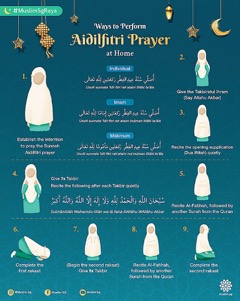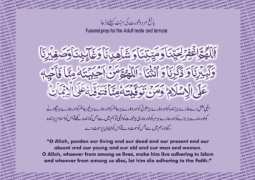
It is Sunnah to make the takbir upon every rising, lowering, standing or sitting, except when one comes up from bowing, in which case one should say, “Allah hears him who praises Him.” Reported Ibn Mas’ud, “I saw the Messenger of Allah make the takbir upon every lowering, rising, standing and sitting.” This is related by Ahmad, an-Nasa’i and at-Tirmizhi, who called it shaih.
Says at-Tirmizhi, “The companions of the Prophet, upon whom be peace, including Abu Bakr, ‘Umar, ‘Uthman, ‘Ali and others, acted according to this hadith, as did their followers and the majority of the jurists and scholars.” Abu Bakr ibn ‘Abdurahman ibn al-Harith reported that he heard Abu Hurairah say, “When the Prophet, upon whom be peace, stood for prayer, he would make the takbir while standing. Then he made the takbir while bowing. When coming up from the bowing, he would say, “Sami’Allahu liman hamidah (Allah hears him who praises Him). While standing, he would say, “Rabbana lakal-hamd (Our Lord, to You is the praise).” Then he would say, “Allahu Akbar” when he would go down for the prostration, when he raised his head, and when he stood from his sitting after the two prostrations. He did that in every rak’ah until he finished the prayer. He prayed in that manner until he left this world.” (Related by Ahmad, al-Bukhari, Muslim and Abu Dawud.)
‘Ikrimah said to Ibn ‘Abbas, “I prayed the noon prayer in al-Butha behind a foolish old man. He would make twelve takbirs by saying it when he prostrated and when he raised his head.” Ibn ‘Abbas said, “That is the prayer of Abu al-Qasim (the Prophet).” (Related by Ahmad and al-Bukhari.) It is preferable to start the takbir when one begins one’s changing of position.
Sunnah acts of prayer, The Manner of Bowing
When one bows, one’s hands must reach one’s knees. It is Sunnah to make the height of the head equal to that of the hips. The hands should be supported by the knees and should be apart from one’s sides. The hands should be open upon one’s knees and thighs, and the palms should be flat. It is reported that ‘Uqbah ibn ‘Amr would bow with his arms separated, his hands on his knees, and his fingers opened beyond his knees. He said, “This is how I saw the Messenger of Allah pray.” (Related by Ahmad, Abu Dawud and an-Nasa’i.)
Abu Humaid reported that when the Prophet, upon whom be peace, bowed, he would be straight, his head neither up nor down (with respect to his hips), and he would place his hands on his knees as if he was holding them.” (Related by an-Nasa’i.)
Muslim records ‘Aishah reporting that when the Prophet bowed, his head would be neither risen nor lowered, but rather between those two positions. Said ‘Ali, “If you put a cup of water on the back of the Prophet, upon whom be peace, while he was bowing, its contents would not spill.” This is related by Ahmad. Abu Dawud recorded it in his Kitab al-Muraseel.
Said Mus’ab ibn Sa’d, “I prayed next to my father. I joined both of my hands and put them between my thighs (while bowing). He stopped me and said, ‘We used to do that, but were later ordered (by the Prophet) to put our hands on our knees.”’ (Related by “the group.”)
Sunnah acts of prayer, The Remembrance of Allah During the Bowing
It is preferred to remember Allah with the following words, “Subhana Rabiyy al-’Azheem (Glory to my Lord, the Great.)” Reported ‘Uqbah ibn ‘Amr, “When ‘Glorify the name of your Lord, the Great,’ was revealed, the Prophet told us, ‘Do so in your bowings.” This is related by Ahmad, Abu Dawud and others with a good chain.
Reported Huzhaifah, “I prayed with the Messenger of Allah, upon whom be peace, and while bowing he would say, ‘Subhana Rabiyy al-’Azheem.” (Related by Muslim, Abu Dawud, an-Nasa’i, at-Tirmizhi and Ibn Majah.)
The phrase Subhana Rabiyy al-’Azheem wa bihamdihi has been related through a number of chains, but all of them are weak. Ash-Shaukani maintains, “The different chains support each other. It is perfectly acceptable for one who is praying to limit himself to Subhana Rabiyy al-’Azheem or to add one of the following:
1.’Ali reported that while bowing, the Messenger of Allah, upon whom be peace, would say, “O Allah, for You have I bowed, and it is You that I have believed in and to You have I submitted. You are my Lord. My hearing, sight, marrow, bones and nerves and what is carried by my feet are for Allah, the Lord of the Worlds.” (Related by Ahmad, Muslim, Abu Dawud and others.)
2.’Aishah reported that while bowing and prostrating, the Messenger of Allah, upon whom be peace, would say, “Glorified and Holy are You, Lord of the angels and the souls.”
3.Reported ‘Auf ibn Malik, “I prayed with the Messenger of Allah one night. He recited al-Baqarah and while bowing said, ‘Glory be to the One of Omnipotence, the Master of the dominions, of grandeur and of honor.”’ (Related by Abu Dawud, at-Tirmizhi and an-Nasa’i.)
4.’Aishah said that when the Prophet, upon whom be peace, bowed or prostrated, he would often say, “Glory and praise be to You, O Allah, our Lord. O Allah, forgive me.” This was how he applied the Qur’an. (Related by Ahmad, al-Bukhari, Muslim and others.)
Sunnah acts of prayer, What Is Said Upon Rising from Bowing and Standing
It is preferred for the one who is praying, whether he be the imam, follower or praying by himself, to say, “Allah hears him who praises Him,” upon coming up from the bowing. When he is standing straight, he should say, “Our Lord, and to You is the praise,” or “O Allah, Our Lord, and to You is the praise.” Abu Hurairah reported that when the Prophet, upon whom be peace, rose from bowing he would say, “Allah hears him who praises Him,” and while standing (straight) he would say, “Our Lord, and to You is the praise.” (Related by Ahmad, al-Bukhari and Muslim.)
Al-Bukhari records in the hadith from Anas, “When he says, ‘Allah hears him who praises Him,’ you say, ‘O Allah, our Lord, and to You is the praise.” Ahmad and others record a hadith from Abu Hurairah in which the Prophet, upon whom be peace, is quoted as saying, “When the imam says, ‘Allah hears him who praises Him,’ you say, ‘O Allah, our Lord, and to You is the praise.’ If one’s statement corresponds to that of the angels, all of his previous sins will be forgiven.” The Prophet said, “Pray as you have seen me pray.” This applies to all of his glorifying and praise statements, even if the person is following the imam. The answer to those who say, ‘One should not combine both of these sayings’ (‘Allah hears him...’ and ‘O Allah, our Lord...’) but only say the one of praise, has been given by an-Nawawi who said, “Our companions say that the mentioning of the command, ‘And you should say, O Allah, our Lord...’ is in conjunction with ‘Allah hears him who praises him.’ But the Prophet, upon whom be peace, only mentioned the statement, ‘O Allah, Our Lord, to you is the praise,’ because they had already heard the statement, ‘Allah hears him who praises Him’ aloud from him. It was his Sunnah to say that phrase aloud, but they did not hear him say, ‘Our Lord, to You is the praise’ because he said it in a subdued voice. They knew the Prophet’s words, ‘Pray as you have seen me pray,’ and knew that it was to be taken in the general sense without any restrictions. They used to say, ‘Allah hears him who praises Him,’ and therefore there was no need for the Prophet, upon whom be peace, to order them to say it again. But they did not know, ‘Our Lord, to You is the praise,’ and therefore he ordered them to say it.”
The two phrases are the least that one should say while standing. But one may add any of the supplicatory words mentioned in the following hadith:
1 Said Raf ah ibn Rafa’, “One day we prayed behind the Messenger of Allah, upon whom be peace. When he raised his head from bowing, he said, ‘Allah hears him who praises Him,’ and a man behind him said, ‘Our Lord, to You is the praise, as much as it can be and as blessed as it can be.’ When the Prophet, upon whom be peace, finished the prayer he said, ‘Who said that phrase earlier?’ A man said, ‘I did, O Messenger of Allah.’ The Prophet said, ‘I saw more than thirty angels chasing after you to see who would record it first.”’ (Related by Ahmad, al-Bukhari, Malik and Abu Dawud.)
2 ‘Ali reported that when the Prophet raised his head from bowing he would say, “Allah hears him who praises Him, and to You is the praise filling up the heavens and the earth, what is between them and filling up whatever You wish in addition to that.” (Related by Ahmad, Muslim, Abu Dawud and at-Tirmizhi.)
3 ‘Abdullah ibn Abu ‘Aufa reported that when the Prophet raised his head from bowing he would say, “O Allah, to You is the praise filling up the skies and the earth and filling up whatever You wish in addition to that. O Allah, purify me with snow, hail and cold water. O Allah, purify me from sins and cleanse me from them as one cleans a white garment from filth.” (Related by Ahmad, Muslim, Abu Dawud and Ibn Majah.)
4 Said Abu Sa’eed al-Khudri, “When the Prophet, upon whom be peace, would say, ‘Allah hears him who praises Him,’ he would (also) say, ‘O Allah, to You is the praise filling up the skies and the earth, and filling up what You wish in addition to that. You are the One who is worthy of praise and glory. This is the most correct statement that a slave could make. And we are all slaves unto You. There is no one who can prevent what You have given. And there is no one who can give what You have prevented. No one can benefit from fortune (in the face of) Your fortune.”’ (Related by Muslim, Ahmad and Abu Dawud.)
5 It has also been authentically reported from the Prophet, upon whom be peace, that after saying “Allah hears him who praises Him,” he would say, “To my Lord is the praise, to my Lord is the praise,” until he would be standing for as long as he was bowing.
TO BE CONTINUED




